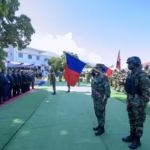Two young men from North Texas are facing exceptionally serious federal charges linked to an alleged plot targeting Gonâve Island, off the coast of Haiti.
According to a November 20, 2025 news release from the U.S. Department of Justice (DOJ), a federal grand jury in the Eastern District of Texas has indicted Gavin Rivers Weisenburg, 21, of Allen, and Tanner Christopher Thomas, 20, of Argyle, in connection with a scheme involving murder, kidnapping and sexual exploitation.
The two men are charged with conspiracy to murder, maim, or kidnap in a foreign country and production of child pornography, U.S. Attorney Jay R. Combs said in the statement.
The DOJ describes the plot as one marked by extreme violence and aimed at a vulnerable Haitian community on Gonâve Island, part of the Republic of Haiti. Between August 2024 and July 2025, investigators say Weisenburg and Thomas conspired to recruit and lead an “unlawful expeditionary force” to the island “to carry out their rape fantasies,” according to the indictment.
Prosecutors allege the pair planned to purchase a sailboat, acquire firearms and ammunition, and recruit homeless individuals in the Washington, D.C., area to form a makeshift mercenary force. This group was allegedly intended to participate in both the invasion of the island and a coup attempt.
Federal authorities say the two men “intended to kill all of the men on the island so that they could turn all of the women and children into sex slaves.” The language used in the indictment underscores the explicitly genocidal and enslaving nature of the alleged plot.
The DOJ also notes that the defendants did more than discuss the scheme online. Prosecutors say they took “numerous concrete steps to advance their invasion plan,” including drafting operational and logistical plans, studying Haitian Creole, recruiting others to join the effort, and enrolling in educational programs to gain skills they believed would be useful for their planned criminal operation.
According to the indictment, Thomas even enlisted in the U.S. Air Force to obtain relevant military training. “Thomas enlisted in the United States Air Force to gain military skills relevant to the invasion plan,” the DOJ statement says. This military dimension, prosecutors argue, shows the project was not a fleeting fantasy but a structured and long-term operation.
In addition to the Haiti-related charges, Weisenburg and Thomas are also accused of production of child pornography, a separate federal offense that carries severe penalties.
If convicted of the foreign-murder conspiracy charge, each defendant faces up to life in federal prison. On the child-pornography charge, they face a mandatory minimum sentence of 15 years and up to 30 years in prison.
The investigation is being conducted by the FBI, the U.S. Air Force Office of Special Investigations, and the Celina Police Department in Texas. The case is being prosecuted by Assistant U.S. Attorney Ryan Locker of the Eastern District of Texas. The DOJ emphasized the multi-agency nature of the investigation, underscoring cooperation between civilian and military authorities.
Beyond the individual actions of Weisenburg and Thomas, the case raises broader questions about international criminal activity and Haiti’s sovereignty. Gonâve Island falls under Haitian jurisdiction, and any violent scheme targeting a foreign territory involves considerations of international law and diplomatic coordination. The U.S. State Department, which oversees American foreign policy and relations with Haiti, traditionally plays a key role when cases involve potential crimes against foreign nationals or operations planned on foreign soil.
The indictment comes at a time when security and human-rights concerns in Haiti are already drawing international attention. The plot described by the DOJ—combining armed invasion, an attempted overthrow, and the enslavement of a civilian population—highlights the precarious vulnerability of isolated island communities affected by political instability and chronic poverty.
Federal authorities also reiterated a central principle of the U.S. justice system: “An indictment is not evidence of guilt. All defendants are presumed innocent until proven guilty beyond a reasonable doubt in a court of law,” the DOJ said.
By making the case public, the Justice Department appears to be sending a strong message condemning extreme violence targeting vulnerable populations abroad and reaffirming coordinated federal efforts—including those involving the State Department—to address transnational crimes. The next steps in the legal process will determine whether the evidence gathered by investigators is sufficient to persuade a federal jury of the existence of the alleged plot and the culpability of the two young Texans at its center.







